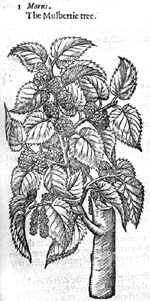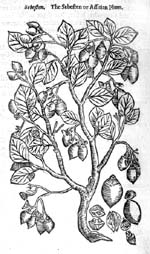Plants
Herbs
Roots
Wood Bark Gum
Fruits
Roses
Animals
Minerals |
Mulberry

“The fruite of ye Mulberry tre louseth ye belly & is good for ye stomack, but it is easeli corrupt or rotten. ... his streyngthe increaseth, if ye put vnto hym alum de pluma, galles, saffron, myr, the sede of Tamarisk, Ireos or Aris, and Frankincense.”
Source: Turner (1568)
“Mulberries ... stay bleeding, and also the reds; they are good against inflammations or hot swellings of the mouth and jawes, and for other inflammations newly beginning.”
Source: Gerard / Johnson (1633)
“... a branch of the tree taken when the Moone is at the full, and bound to the wrist of a womans arme whose courses come downe too abundantly, doth stay them in a short space ...”
Source: Parkinson (1640)
Lemon

“Malus medica which is called malus Assyria, is also called Citrus, in Englishe a Citron tre. Unver the which tre, are also conteyned the Orenge and the Limon tre, as pereteynyng vnto the same kinde. ... There is no better remedy that commeth, if the cruell stepmothers haue poysoned ye cuppes, & haue menged herbes & hurtefull wordes together, for it dryueth black poyson out of the membres. ... It is good for greuyng weomen or such as lust and long for strange meate. It is thought to saue clothes from beyng gnawed of mottes if it be layd amongest clothes.”
Source: Turner (1568)
“The juyce of Lemmons is singularly good to use at Sea in long voyages to put into their Beverage to keepe them from the Scurvy ... ”
Source: Parkinson (1640)
Sebesten

“Small Berries rather than Plums... are gathered and laid in the Sunne, whereby they grow wrinkled, and so they are kept, and brought over unto us in boxes. ... groweth in Syria ... the Arabians called them Sebesten; and the Apothecaries in their shops use that name onely.
... they are very effectuall also to lenifie the hoarsenesse and roughnesse of the throate: they helpe the cough and weesing of the lungs � by lenifying the passages and causing much flegme to be avoyded ... they also drive forth the long wormes of the belly.”
Source: Parkinson (1640)
| |